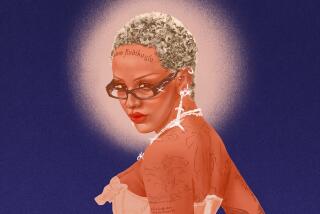Attack of the Dolls
- Share via
THE Pussycat Dolls -- an ethnically diverse pack of bump ‘n’ grind Barbies in fishnet stockings, black leather and lingerie -- is turning into a global phenomenon, amassing Top 10 hits in 14 countries. Just last week, its single “Buttons” rose to No. 4 on Billboard magazine’s Hot 100 chart, marking the third time a song from the bubblegum pop sextet’s debut CD, “PCD,” has cracked the Top 5 inside of a year. Now “Buttons” is on track to rise even higher up the chart on Thursday, according to shipping projections.
In an era of stagnating record sales and widespread music industry hand-wringing, the Los Angeles-based Dolls’ latest hit cements its reputation as one of this century’s few breakout successes; “PCD” has remained among the Top 50 albums for 45 weeks and sold 4.7 million albums worldwide. “It’s unusual for any act to get as many as four hits off an album anymore,” said Geoff Mayfield, Billboard’s senior analyst and director of charts. “For much of this decade, it’s been a real challenge to get a third or even a second hit. And that’s not just for new artists. That’s for established artists too.”
But whether the Dolls’ success represents a triumph of marketing or genuine artistry has been of some debate in critical circles. “If this group was any more prefab,” a reviewer for the Pitchfork music website said, “it would be made of aluminum siding.”
“Put any label on it you want,” said Geffen Records Chairman Ron Fair (Interscope Geffen A&M; Records is the umbrella organization that distributes the Dolls CDs). “When you have a string of hits of this quality, it proves itself.”
As its creation myth goes, the Dolls began life 10 years ago as a burlesque troupe organized by choreographer Robin Antin. Back then it was composed of her famous friends, such as actress Christina Applegate -- early routines were worked out in Applegate’s garage dance studio -- and an ever-changing roundelay of local dancers. Performing at Hollywood venues the Roxy and the Viper Room, the act’s lighthearted approach to raw sex appeal -- and strict no-nudity clause -- garnered insider buzz and attracted cameo appearances by Scarlett Johansson, Gwen Stefani, Carmen Electra and Christina Aguilera, among many others. After Stefani took Interscope Geffen A&M; Chief Executive Jimmy Iovine to a performance, he had a eureka moment: “The day I saw it, I said, ‘This could be Moulin Rouge meets the Spice Girls,’ ” Iovine recalled.
Beginning in 2004, band members were extensively auditioned by Fair, who eventually whittled the list to six: Nicole Scherzinger (a former member of the reality-TV girl group Eden’s Crush), Ashley Roberts (who worked in TV commercials and music videos), Kimberly Wyatt (who studied dance at New York’s Joffrey Ballet and sang on cruise ships), Jessica Sutta (formerly a captain for the Miami Heat dance troupe), Carmit Bachar (a member of the 1992 national rhythmic gymnastics team and Ricky Martin’s “La Vida Loca” dancer on his world tour) and Melody Thornton (a former backup singer).
Hit-makers such as Southern hip-hop savant Timbaland, the Black Eyed Peas’ Will.I.Am, Gnarls Barkley’s Cee-Lo Green and songwriter-producer Kara DioGuardi were hired to ensure maximum radio friendliness for the Dolls’ high-gloss R&B-lite; sound. Brand-name rappers such as Busta Rhymes and Snoop Dogg were enlisted to spit rhymes on remixes.
“We never wanted to go into the sex industry or the strip-tease industry,” Fair said. “We thought it could be a bona fide singing group. We thought we could make it into a record-making concern.”
The Dolls’ confoundingly catchy first single, “Don’t Cha,” which reached No. 2 on the Hot 100, defines the group. “Don’t you wish your girlfriend was hot like me?” band members sing. “Don’t you wish your girlfriend was a freak like me?” (Blender magazine responded on behalf of its largely male readership by putting the group on its July cover with the headline, “Yup, we do wish our girlfriends were hot like you.”) Its second single, “Stickwitu,” proved the Dolls -- and, in particular, lead singer Scherzinger, who wrote several of the songs and, as the primary face and voice of the group, is its acknowledged breakout star -- could be as adept with a slow-jam ode to monogamy as with a hyper-sexualized party thumper.
“PCD” reentered the album chart last week after the group performed “Buttons” (the album’s fourth Top 20 hit) on the Fox TV show “So You Think You Can Dance.”
Reached by phone last week in Japan at the tail end of the Dolls’ Asian tour, Scherzinger expressed her incredulity at the group’s domestic success as well as its worldwide popularity.
“We just did the Philippines last night. I feel like I could have picked my nose up there and they would have loved it,” she said. “It’s really surreal. All our hard work is getting us somewhere.”
Wyatt has been with the Dolls since 2002, hired by Antin as a dancer before an audition with Fair landed her a place in the group. “I didn’t know what I was getting into,” Wyatt said. “I just knew it was a lot of fun and all these celebrities were fans of it. It’s something I never could have guessed in a million years would be as big as it is.”
According to Fair, at its inception the project faced resistance from outside and inside the label. “The entire universe was a gatekeeper for the Pussycat Dolls,” he said. “People want to hate on them. ‘Oh, it’s strippers.’ ‘Oh, it’s a manufactured group.’ I would hear everywhere that the songs weren’t good, that it wasn’t going to work, that it wasn’t hip. We just forged ahead.”
The group has spawned a namesake club, the Pussycat Doll Lounge in Las Vegas, a line of branded apparel and makeup, and is negotiating with television executives about an unscripted series. Even though its deal to market a line of Barbie-like dolls with Hasbro fell through because the toys were deemed too racy, Iovine said Interscope plans to put out a line of Pussycat Doll dolls in the near future.
“This is a multi-pronged group. It is a brand,” Iovine said. “We are involved because somebody had a real idea. It wasn’t, ‘Let’s start the next Backstreet Boys.’ This is one of the rare [manufactured] pop groups to have a history. It started in a garage. That gives it legitimacy.”
More to Read
The biggest entertainment stories
Get our big stories about Hollywood, film, television, music, arts, culture and more right in your inbox as soon as they publish.
You may occasionally receive promotional content from the Los Angeles Times.











